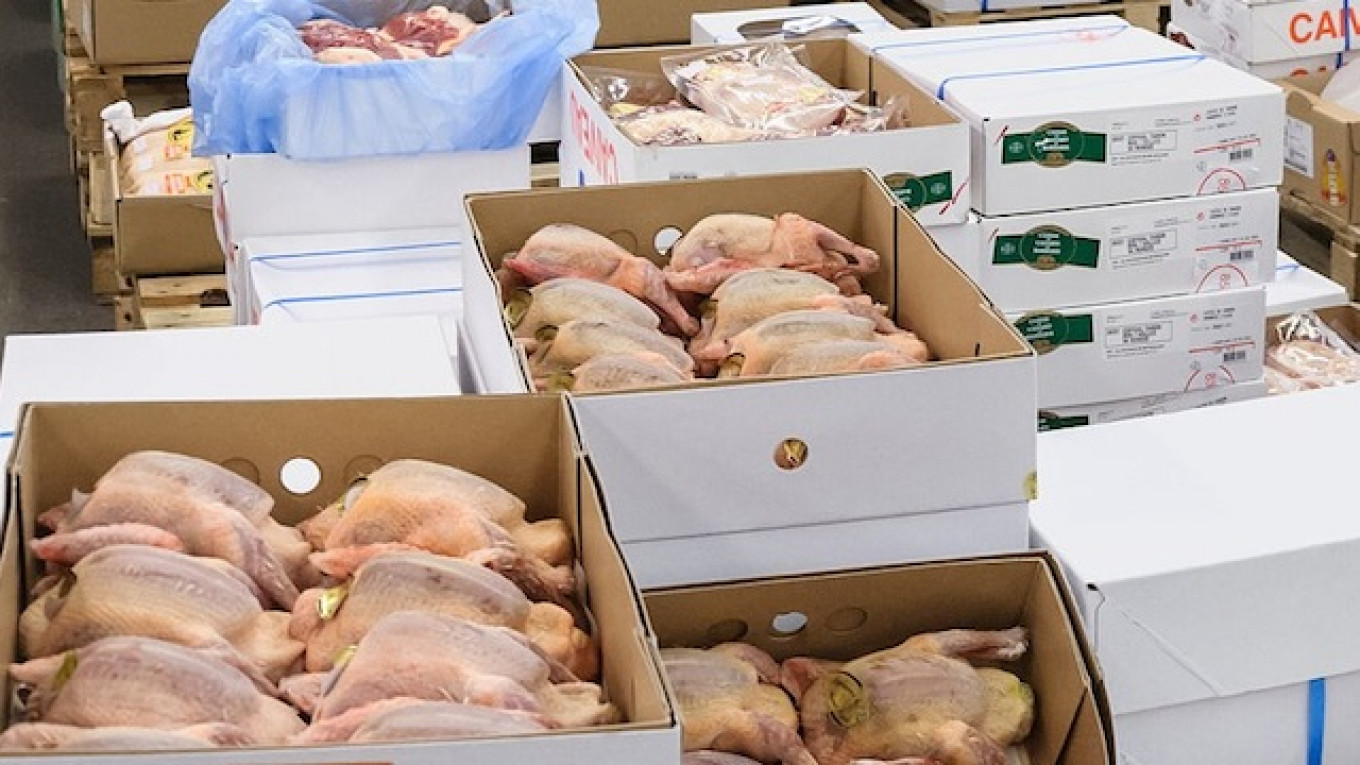Russia's threatened ban on U.S. poultry imports, the latest move in a sanctions skirmish over Moscow's support of rebels in Ukraine, has agriculture companies alert to the risks of a conflict that's already roiled trading of crops ranging from soy, beef and fruit to California pistachios.
Moscow has struck back against trade sanctions following the downing of a Malaysian jetliner last month by imposing food restrictions, and would add U.S. chickens to Ukrainian soy and other products Russia has blocked since it seized Crimea earlier this year: Australian beef, Latvian and Lithuanian pork, Moldovan fruit and Ukrainian juice.
Sanderson Farms, the third-largest poultry producer in the U.S., is among American agricultural companies preparing to respond if Russia carries out plans, reported in Russian media this week, to restrict imports of U.S. poultry.
Russia is "using foreign trade as a political football" by threatening to limit poultry imports, Sanderson's CFO Mike Cockrell said. The Mississippi-based company is lining up other buyers for its chicken in case Moscow imposes a ban.
"We'd be crazy not to be making calls to alternative markets right now," he said.
Russia's move to limit agricultural trade is seen as a sign the conflict with Washington is heating up. Russia imported about $1.3 billion in U.S. food and agricultural products last year, or about 11 percent of all U.S. exports to the country, according to U.S. Census data.
U.S. pistachio farmers have seen sales to Russia, the seventh largest export market, cut nearly in half this year because political tensions have made Russian importers hesitant to make purchases, said Peter Vlazakis, export market coordinator for the American Pistachio Growers.
Pistachio exporters have "a legitimate fear" about the potential for trade disruptions, Vlazakis said.
Russians may turn for pistachios to Iran, the world's second largest producer after the United States.
Major grain trading houses also have been affected by the rising tension between the U.S. and Russia.
An armed group last month occupied a Cargill sunflower-seed crushing plant in eastern Ukraine, a region supportive of the Putin government, and commodity trader Glencore is expected to have a hard time selling grain silos in the country.
Last week, the farm sector's attention turned to poultry after Russia's Federal Veterinary and Phytosanitary Inspection Service said it found signs of the antibiotic tracycline in four shipments of U.S. poultry. The service could not be reached for comment.
The food safety watchdog's threat to ban U.S. poultry imports, reported in government-controlled Russian media, came days after fresh U.S. and EU sanctions over Russia's support of rebels in Ukraine.
Russia is the second largest importer of U.S. broiler meat behind Mexico, buying 276,100 tons last year, or 8 percent of U.S. exports, according to the U.S. Department of Agriculture. Russia's purchases from January through May 2014 represented 7 percent of U.S. exports.
U.S. poultry exporters and producers said there were no problems with the meat. For some, the situation was hardly their first time dealing with trade troubles with Russia.
Russia has repeatedly been accused by the West of using food safety concerns and its veterinary service as instruments to ban supplies from countries with which it has strained relations or to protect its own industry. Explicitly banning a country's products for political reasons would violate World Trade Organization rules.
Trade restrictions in prior years have caused some companies to back away from deals with Russian importers, said Jim Sumner, president of the USA Poultry & Egg Export Council.
The council has advised poultry companies to keep in contact with Russian importers so they will get early warnings should Moscow impose a ban.
Privately held poultry producer Perdue Farms is one company that does not export to Russia.
"In retrospect, that was probably a pretty smart move that Perdue made," Sumner said.
A Perdue spokeswoman told Reuters she did not know why the company did not deal with Russia.
For Russian President Vladimir Putin, targeting agricultural imports could be a low-cost way to retaliate against U.S. sanctions over Ukraine.
Other threats, especially any involving Russia's export of oil and gas shipments, likely would bring additional sanctions on Moscow, said Robert Kahn, a senior fellow for international economics at the Council on Foreign Relations.
Russian sanctions on farm products would be "quite painful" for the companies affected, although the macroeconomic effects on the U.S. economy would be small, he added.
"These are fully political decisions," Kahn said.
See also:
Russia to Halt Imports of Kentucky Gentleman Bourbon
Russia Slaps Duties on Moldovan Imports in Mounting Trade Offensive
A Message from The Moscow Times:
Dear readers,
We are facing unprecedented challenges. Russia's Prosecutor General's Office has designated The Moscow Times as an "undesirable" organization, criminalizing our work and putting our staff at risk of prosecution. This follows our earlier unjust labeling as a "foreign agent."
These actions are direct attempts to silence independent journalism in Russia. The authorities claim our work "discredits the decisions of the Russian leadership." We see things differently: we strive to provide accurate, unbiased reporting on Russia.
We, the journalists of The Moscow Times, refuse to be silenced. But to continue our work, we need your help.
Your support, no matter how small, makes a world of difference. If you can, please support us monthly starting from just $2. It's quick to set up, and every contribution makes a significant impact.
By supporting The Moscow Times, you're defending open, independent journalism in the face of repression. Thank you for standing with us.
Remind me later.






